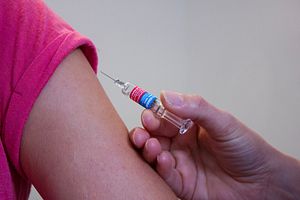North Korea has maintained a near-total closure of its international borders for the past two years, effectively halting economic activities and trade with other nations. While the economic consequences of this isolation are evident, what often goes unnoticed is the profound impact on the lives of the most vulnerable, especially children.
During the border closure, children in North Korea have been left behind, deprived of life-saving vaccines and medical supplies. No vaccine supply crossed the border to North Korea, so childhood immunization coverage dropped precipitously from 2020 to 2022. Recent data from the World Health Organization (WHO) and United Nations Children’s Fund (UNICEF) revealed that North Korea’s childhood immunization coverage (specifically for the DPT 3 vaccine, often used as an indicator for overall childhood vaccines) has dropped from 97 percent in 2020 to 41 percent in 2021, then reached 0 percent in 2022. That means no child in North Korea received the life-saving vaccines in 2022.
The cost of inaction is immense. The failure of childhood immunization can result in a resurgence of diseases such as measles, polio, pertussis, and many more. It will increase the significant burden on North Korea’s already struggling health system and undermine the herd immunity that protects many more children, especially the most vulnerable ones. Long-term health consequences must also be counted, even for those who survive an initial infection. For example, polio infection can lead to life-long disability, and rubella during pregnancy can lead to congenital rubella syndrome in infants.
North Korea used to have great childhood vaccination coverage before the COVID-19 pandemic. Over the last decade, North Korea has maintained an over 95 percent immunization rate for key childhood vaccines, such as BCG and measles. Global health institutions such as GAVI (the Vaccine Alliance), UNICEF, and the WHO have worked closely with the North Korean government to maintain strong childhood immunization coverage. North Korea also has a relatively strong health service delivery system. If Pyongyang is willing to restore the childhood immunization service, they have the means to do so.
The good news is that North Korea is gradually opening its borders. North Korean leader Kim Jong Un’s recent visit to Russia and follow-up actions indicate that the country seems to have resumed cross-border trade.
As the border reopens, I propose that the South Korea-U.S. alliance take three actions to help North Korean children. First, approach this issue as a public health crisis. In 2022, more than eight out of 10 children worldwide received the DPT3 vaccine, protecting them against infectious diseases. For North Korean children, there was not a single vaccine. When it comes to childhood immunization, there is no space for politics. The immunization gap is a public health crisis, and we must prevent the future cost of inaction.
Second, work with China. Zero childhood immunization coverage is a huge health risk for both North Korea and its neighboring country, China. China can influence North Korea to open the international border fully. Doing so will revitalize the vaccine supply and logistics for the childhood immunization program. The swift acquisition of vaccines and restoration of immunization services can have an immediate impact. Without it, the potential for another lost generation looms large.
Third, channel the funding and technical support through international organizations such as GAVI, the WHO, and UNICEF to support North Korea. A nationwide catch-up campaign requires massive resources to vaccinate those children who missed the life-saving vaccines in the last two years. North Korea is open to working with international organizations for public health programs. These organizations can play a crucial role in supporting North Korea’s efforts for the catch-up effort.
Every child deserves equitable access to vaccines, and a 0 percent immunization coverage rate is a neglect of moral responsibility for any nation. Our shared duty as an international community is to ensure that children in North Korea and around the world receive the vaccines they need to live healthy. The call to restore North Korea’s vaccine program takes on a new and urgent meaning when we focus on the well-being of innocent children.
North Korea can swiftly execute immunization drives but requires international support, funding, and political will. Let us set aside political differences and unite in our shared humanity to ensure North Korean children receive the life-saving vaccines they desperately need. It is time to make North Korea’s childhood immunization coverage great again, not for political aims but for the children.

































